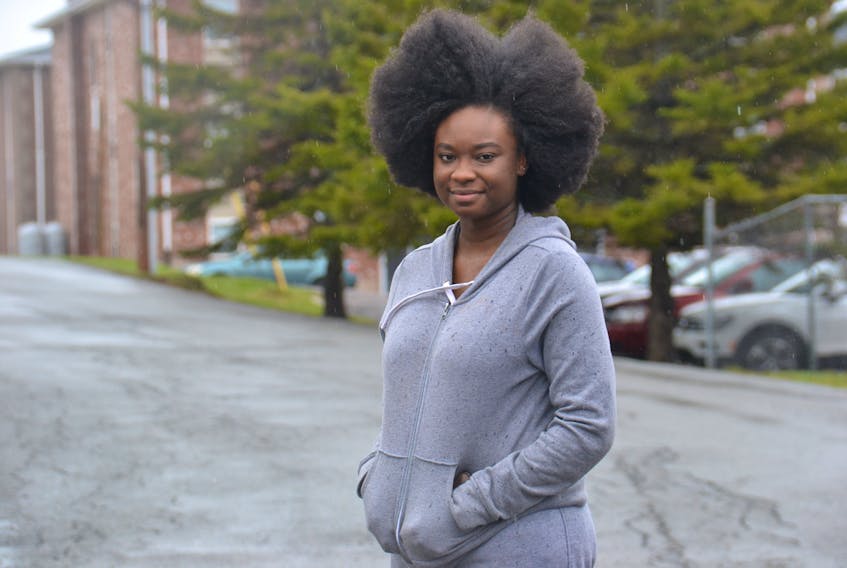After Precious Ojo lost her call centre job in December, she decided to focus on her studies at UPEI over the winter semester, hoping she would find a job in the spring.
The UPEI psychology student was one of many international students who were out of a job after the TTEC Canada call centre in Charlottetown closed its doors, resulting in job losses for 222 people.
Five months later, in the midst of the coronavirus pandemic, Ojo’s summer job prospects seem grim. She has looked into financial assistance programs offered to other Islanders hard hit by the pandemic.
"Most of the funding, I am not eligible. I didn't have a job, so it's really tough. So, I don't know what category I fall on," Ojo said.
Ojo, who came to P.E.I. from Nigeria, is not eligible for two key federal income relief programs. The Canada Emergency Student Benefit (CESB), which provides Canadian post-secondary students with $1,250 per month, excludes international students. Ojo says she has looked into the Canadian Emergency Response Benefit (CERB), which provides workers who have lost employment with up to $2,000 per month, but she believes she does not meet that program’s eligibility either. Her job was lost before the COVID-19 pandemic, not because of it.
Ojo did manage to obtain a student adversity award, offered through UPEI. She was also able to successfully apply for a $1,000 provincial subsidy over three months to help defray the cost of rent through the province’s temporary rental assistance benefit.
But Ojo was also turned down after applying for another financial assistance program offered by the UPEI Student Union announced in late March. That fund received a high number of applications.
"Even funding from school is very, very limited because you need to state the amount you need and what you need it for," Ojo said.
"It’s not guaranteed you’re going to get it."
Ojo’s experience was similar to that of four other international students interviewed by The Guardian. Like other students and workers, all four are struggling to make ends meet.
Facing reduced employment opportunities, many don’t know which income relief programs to turn to.
Some said parents or other family in their home country have lost their jobs because of the pandemic, meaning their source of financial support has been cut off.
“I have a lot of friends who are in that situation right now. They've lost their jobs and they are not eligible for any of the government funding ... I'd describe it as invisible. It just makes you feel like, 'well, you're not important’."
- Amirah Oyesegun
“I have a lot of friends who are in that situation right now. They've lost their jobs and they are not eligible for any of the government funding,” said Amirah Oyesegun, who studies food and nutrition at UPEI.
"I'd describe it as invisible. It just makes you feel like, 'well, you're not important’."
Oyesegun is part of a group called Black, Indigenous, People of Colour United for Strength Home Relationship (BIPOC USHR). The group has started a fundraising drive to help international students. Many are seeking help paying for necessities like groceries.
The demand has far exceeded the group’s fundraising capacity. BIPOC USHR has raised around $1,000 over the last month; over 150 individuals have applied for assistance.
Early in the pandemic, the UPEI administration opened up a pre-existing student adversity fund to students facing hardship. A total of $77,000 was dispersed, largely to international students. A representative of UPEI told The Guardian 259 applications for financial assistance were received but the university was only able to distribute funds to 122 of those.
The UPEI Student Union also established a $16,000 fund out of the remainder of the organization’s yearly budget. Over 200 students applied for this.
"I know so many people who applied, and they didn't get anything," Oyesegun said of the on-campus supports.
The following are relief programs and eligibility available for international students:
Post-secondary student support fund
- Offered through UPEI, Holland College and College de L’Ile
- At UPEI, offered through the Scholarships and Awards Office
Canada Emergency Response Benefit
- $500 per week for up to 16 weeks
- Must have earned at least $5,000 in last year of work
- Work must have stopped or hours have been reduced due to COVID-19
P.E.I. Temporary Rental Assistance Benefit
- $1,000 in rental assistance over three-month period
- Application deadline is May 8
- Must show proof of rental situation, provincial health number, Social Insurance Number
P.E.I. Special Situations Fund
- Up to $1,000 for “urgent income loss”
- Must not be eligible for Employment Insurance
- Must show ineligibility for other COVID-19 income support such as EI, social assistance
In late April, the provincial government allocated a further $95,000 to student organizations at UPEI, Holland College and College de L’Ile for financial relief. At UPEI, these funds are being administered by university administration. Students can apply for grants through UPEI scholarships and awards until May 15.
The provincial government has established several income relief programs. None of the programs disqualify international students, but the eligibility requirements of some make it difficult for international students to qualify.
A provincial emergency relief-worker assistance program offered as much as $250 per week to workers. But an employee had to have experienced a drop of at least eight hours per week to qualify. Most international students were unable to work more than 20 hours per week as part of their student visa restrictions and may not have lost eight hours as a result.
Another program, the COVID-19 Income Support Fund, offered a lumpsum payment of $750 but required an individual to have first applied for either the CERB or EI.
Some international students, like Ojo, have been successful in applying for the Temporary Rental Assistance Benefit, which provides $1,000 for households over a three-month period to help with the cost of rent. However, applicants require a P.E.I. health card, which many international students had not obtained before the pandemic hit due to their coverage under the university health plan.
One UPEI student The Guardian spoke to, who is supporting a child as well as her mother, had not been able to obtain a P.E.I. health card because of an expired study permit. This student was told she needed this to apply for the rental assistance benefit.
Another program, the Special Situations Fund, was specifically established for individuals who did not qualify for other programs. But a member of BIPOC USHR told The Guardian several students who applied for the program were turned away.
A written statement from the Department of Education and Lifelong Learning pointed to the student-specific funding support at UPEI, Holland College and the College de L’Ile.
“We are doing as much as we can as a government to support post-secondary students, including international students,” said Education Minister Brad Trivers in a written statement.
“Working with post-secondary institutions, we have provided student unions with financial support under the post-secondary student support fund. Student unions have established their own eligibility criteria to ensure students who need assistance receive it.”
The Guardian reached out to the UPEI Student Union but was told a representative could not be made available for an interview as the union is in the midst of transitioning to a new elected executive.
A government representative also said international students are eligible for the Special Situations Fund. The representative said no one has yet been turned down for the fund.
It is unclear how many of the 1,500 international students on P.E.I. are facing financial hardship due to COVID-19. The province does not track demographic data on relief programs, such as gender or immigration status.

Charlottetown MP Sean Casey said his office has received few requests for help from international students who are trying to navigate the financial programs available.
The federal government’s Canada Emergency Student Benefit, the main federal support for students affected by COVID-19, has been criticized for leaving out international students by the Canadian Federation of Students.
Casey defended the decision to focus the CESB on domestic students.
"Every single international student is here on a student visa. And one of the requirements of the student visa is that they have the financial means to support themselves while they are studying abroad," Casey said.
"We have put priority on those whose income has been eliminated or whose economic situation has been severely affected."
The UPEI Student Union has praised the federal government for the CESB program but, in a media statement, expressed “hope” that international students would be included.









